We Love Binghamton, New York!!!
CLOSE TO HEAVEN, Golfing On Top of Mount Prospect, The History of Ely Park Municipal Golf Course, Binghamton, New York
—WOW, new information! S. Mills Ely Co.sold to McTighe Grocery Co. In 1919 about 12 years after the death of S. Mills Ely! I wonder what happened to the McTighe Grocery Co…. present day??? Roger Luther Joe Danvers Edward G Brewer Christine Pavlisak Ray Linsky
Spanning Time: Mountain’s Name, Face have Changed by Gerald R. Smith
By Gerald R. Smith
Published July 24. 2014 (PressConnects.com)
ALL CREDIT for Article below to Gerald R. Smith and PressConnects.com
ALL CREDIT for Pictures to the Broome County Historical Society
Story Highlights:
Prospect Mountain has been known as Mt. Prospect since the 1780s
In the 1800s, Dr. O.V. Thayer developed a resort atop the mountain using the natural spring waters.
By the early 1960s, homes were demolished or moved to make way for Route 17.
While traveling a midst all the road construction around Kamikaze Curve, I had time to ponder the excavation of the rock and gravel that the crews were sculpting away to make room for the new roadway. I also had time to wonder about the history of that area and how it seems to have been recently renamed.
Since the 1780s, that spot has been known as Mt. Prospect. Only with the Department of Transportation project along the Route 17-Interstate 81 connection has it been called Prospect Mountain. It was the first settlers after the end of the American Revolution who arrived and made their way to the top of the hill to cast their eyes upon the vista of the valley below that one of them called it Mt. Prospect — much like our own airport sits upon Mt. Ettrick.
Despite the current misnaming of the mountain, it holds a long and interesting history. One of the first schools in Broome County, dating from the late 1790s, was held at the base of the hill in an area near the former McCormick’s Paint Store. While Prospect Street became an early connector between Binghamton and points west, it was the spring water that provided the source for much of the interest in Mt. Prospect.
By 1849, Dr. O.V. Thayer seized upon his plan to develop a resort atop the mountain using the natural spring waters for a curative effect. This was the era of Saratoga Springs, Ballston Spa and other areas, and we were not to be outdone. Thayer built a hotel with baths for his Binghamton Water Cure. It seemed like a great idea, but it never caught on in this area as it did elsewhere.
Text from the Binghamton Water Cure picture added here:
“This Institution was established in Binghamton in 1849, since which time it has treated successfully thousands of invalids. The Cure is beautifully situated on the side of Mt. Prospect, surrounded by large trees, and commanding a fine view of the city, rivers, hills and the magnificent scenery in the immediate vicinity, and abundantly supplied with pure, soft spring water, the great essentials for hydropathic purposes.
The bath-rooms have facilities for giving a wide variety of baths, such as Full, Half, Shallow, Douche, Eye, Ear, Nasal, Spray, Steam, Medicated, etc.
Dr. and Mrs. O.V. THAYER have the entire charge of the Medical Department. Their large experience and extensive public and hospital practice for more than twenty years, and the success attending their labors, gives them confidence recommending their Institution as a place where sick people can be cured. Surgical as well as medical cases are solicited. All needed surgical operations skillfully performed, and the hygiene treatment, so successful to rapid recovery, continued at the Cure when necessary.”
Back to Gerald R. Smith’s article:
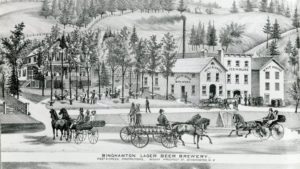
This 1866 engraving shows the Binghamton Lager Beer Brewery. Photo Credit: Broome County Historical Society.
Shortly after the Civil War, the curative spring movement basically dried up and the area was converted into the Binghamton Lager Beer Brewery — one of several breweries that would last until Prohibition in the early 20th century. An 1866 engraving shows a highly romanticized view of a multiple building complex that smartly used the spring water for their products.
S. Mills Ely was a wholesale grocer who thrived in business in Binghamton. His stately home on the corner of Henry and Chenango streets would be greatly changed to become home to the Morning Sun newspaper (See NOTE No. 1 below). He purchased a large tract of land atop Mt. Prospect to build a summer home. He had lumber taken from a failed fundamentalist tabernacle (See NOTE No. 2 below). and had it reconstructed as Ely Tower which overlooked the entire river valley.
In 1907 and in declining health, Ely donated that tract of land to the City of Binghamton to be used for a park. For two years, the tower was a popular spot for residents to visit (See NOTE No. 3 below). In 1909, a windstorm took the tower to the ground, and the park would later be re-purposed for the Ely Park Golf Course.
Even before Ely gave the land for a public park, people would hike the pathways for outings atop Mt. Prospect. Picnickers, hikers and artists clambered to the top to rest, eat and use the magnificent views for inspiration. First Ward residents long remember the many steps through a concrete gateway to Ely Park as they lumbered up the hillside. But by the beginning of the 20th century, those days of ease were already numbered.
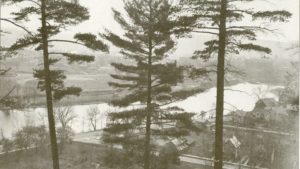
View from Mt. Prospect of Stow Flats in 1902. Photo Credit: Noyes Collection, Broome County Historical Society
By the 1950s, plans were set in motion to modernize our transportation. The era of the interstate highway ended much of that mountain’s history (See NOTE No. 4 below). The hill became the site for the reconstruction of Route 17, which for decades has meandered along the valley. By the early 1960s, homes were being demolished or moved to make way for the improved roadway.
The stairs to Ely Park were destroyed, and the former park was converted to be used solely as the golf course (See NOTE No. 5 below). Within a handful of years, the new moniker of Kamikaze Curve stuck as the number of accidents in that area quickly mounted. Today, you can call it Mt. Prospect, Prospect Mountain or Kamikaze Curve — but whatever it is called, that hill has led an ascendant role in our history.
ALL CREDIT for above Article to Gerald R. Smith and PressConnects.com
ALL CREDIT for Pictures to the Broome County Historical Society
NOTES respectfully submitted by Andy Reistetter:
NOTE No. 1: Per current Broome County Historian Roger Luther the home of S. Mills Ely was located at 85 Henry Street across from Carroll Street; currently where stands the new Post Office.
NOTE No. 2: “From a failed fundamentalist tabernacle,” is inaccurate. Per Tom Cawley’s Article entitled: “One Man’s Outlook: Ely Tower Symbol of Faith,” the Evangelist B. Fay Mills ‘tabernacle’ on Water Street was a hall that was built to be temporary.
“Mr. Ely was a very religious citizem. At the turn of the century, there was an Evangelist he admired a great deal, B. Fay Ely. There was built on Water Street a temporary hall, where Evangelist Ely preached nightly. Importer Ely attended with fervor, and when the series of sermons ended, he didn’t want to lose the building, even though it had to be torn down. So he bought the lumber and had it transformed into a tower…”
NOTE No. 3: The Ely Tower was a popular spot for residents to visit since its erection in 1893. in the article “Ely Tower Demolished” it was stated: “It was erected in 1893 by S. Mills Ely from the lumber which he bid off at auction which had been used in the great temporary building in which the B. Fay Mills evangelistic meetings were held in that city in 1892. The tower was put up as a memorial to these meetings and thousands of people ascended it each year to get the view.”
NOTE No. 4: The history of Mount Prospect continues to this day as people grow up there, learn to play golf, and make their contributions to society throughout the world…
NOTE No. 5: I believe that the land donated by S. Mills Ely exceeded what is currently used for Ely Park Golf Course and includes parkland for picnics and a tennis/basketball in addition to wooded areas being retained in their natural state.
Death of S. Mills Ely (Wednesday, May 5th, 1909)
Binghamton Loses Citizen Whose Devotion to Principle Was Most Prominent
GAVE TO MANY CHARITIES
Contributed to Several Libraries, and Recently Gave Ely Park to the City
S. Mills Ely, whose serious illness for some weeks past has been a matter of deep concern throughout the city, died mast night at his residence on Henry Street. The end came at 9:40 o’clock. Just two weeks before, at the same hour, Mr. Ely was taken aboard the private car in which he was brought from his Winter home in Maitland, Florida, in the hope that the more invigorating northern atmosphere might make possible a recovery which seemed impossible in the South.
Mr. Ely’s death removes a man whose long and successful business career was unmarred by any suggestion of unfairness and whose charities were widespread and wisely bestowed. In writing of his character an intimate friend of the family said:
“To speak of his character is hardly necessary in this community, where his life was an open book, known and read by all, and his inherent modesty and simplicity forbid any words of fulsome praise. But truth compels the notice of a detailed thoughtfulness and a most unusual grasp not only in business matters, but in every path of friendship and benevolence, with a generosity as constant as the calls made on it. Still, after all, the deep interest and devotion of his life, after his family, was in his church to which he unceasingly gave of his means, his time, and his prayers.”
Mr. Ely was born in Chester, Connecticut of English ancestry, in October, 1837, and came to Binghamton, where his life has since been spent, 15 years later. His first employment was with Charles McKinney, in a general store, and later in the coal business. With S. McKinney and E.P. McKinney, he formed a partnership in the grocery business, withdrawing in 1873 to establish the wholesale grocery house which continues. The partnership with E. F. Leighton, which continued unbroken until last October, was formed in 1876.
True to Principle.
His business was conducted with absolute conscientiousness and absolute devotion to what he thought was right. Mr. Ely did not use, or believe in the use of tobacco, and the firm of S. Mills Ely & Co., considering principle before profit, never has carried or sold tobacco, or smokers’ supplies, though this is an important and very profitable line with all wholesale grocers. Persons familiar with the trade do not recall another wholesale grocery house which does not carry tobacco.
Mr. Ely was a Senior Elder at the First Presbyterian Church. He united with the church during the pastorate of Dr. Goodrich, and was for many years an officer of the church, being deacon for some time, and an elder for the last 30 years. Aside for his liberal support of the church, Mr. Ely has bestowed many charities, which he administered with the sagacity of a man of affairs, tempered with a tenderness which led him to conceal even from his most intimate associates his activities in this direction.
Many Charities.
Among other charities with which, because of their public nature his connection was known, Mr. Ely gave liberally of his time and money to the Fresh Air Fund, and always entertained a dozen city children during the Summer at Mount Prospect. He was treasurer of the Society for the Prevention of Cruelty to Animals, and, when the new Y.M.C.A was being canvassed, he was one of the most energetic supporters of the project.
 Mr. Ely gave a library to his native town of Chester, Connecticut, and contributed liberally for a library in Port Dickerson. In Maitland, Florida where he had an orange grove and Winter home, Mr. Ely and another gentleman made possible the erection of a fine library.
Mr. Ely gave a library to his native town of Chester, Connecticut, and contributed liberally for a library in Port Dickerson. In Maitland, Florida where he had an orange grove and Winter home, Mr. Ely and another gentleman made possible the erection of a fine library.
Soon after he embarked in business for himself 32 years ago, Mr. Ely began to acquire property on Mount Prospect, After the B. Fay Mills revival meetings 15 years ago, he bought the lumber with which the tabernacle, in which the meetings were held, had been constructed, and used this to erect Ely Tower on Mount Prospect as a memorial of the religious revival. His recent gift to the city of Ely Park, comprising 140 acres on the summit of Mount Prospect, is a recent evidence of his public spirit. The only public office that Mr. Ely held was that of school commissioner, which he held for three years.
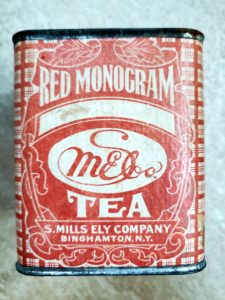 Mr. Ely was married in October, 1867 to Miss Mary Hawley, who died last December. Surviving are a sister and a daughter.
Mr. Ely was married in October, 1867 to Miss Mary Hawley, who died last December. Surviving are a sister and a daughter.
Before his death Mr. Ely requested that his funeral services be simple, and in deference to his wishes, the family requests that friends omit moral tributes. Services will be held at the house tomorrow afternoon and Fr. Lawrence of the First Presbyterian Church will officiate.
At the meeting this afternoon, the employed officers of the Young Men’s Christian Association of the State of New York, in conference assembled at Binghamton, would unanimously record the profound impression by the life of of the late S. Mills Ely. His deep appreciation for the needs of men, his faith in our Heavenly Father, his confidence in his fellow citizens, his courage, and his consecration, made him a leader in establishing a work in Binghamton which can not fail at being most effective at elevating the young manhood of the community.
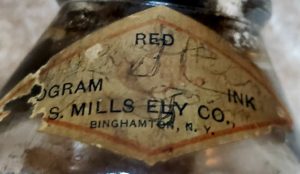 “The work of Mr. Ely in the encouragement and support of efforts in behalf of young men has been felt beyond Binghamton and has been an inspiration to the Association throughout the State and the Nation.
“The work of Mr. Ely in the encouragement and support of efforts in behalf of young men has been felt beyond Binghamton and has been an inspiration to the Association throughout the State and the Nation.
“We unite with the city of Binghamton in mourning the departure of this useful citizen, with the churches and the Young Men’s Christian Association in the loss of this earnest follower of the Master, and we deeply sympathize with his family at this time of sorrow.
(Signed)
“Frank G. Banister, John W. Cook, Herbert P. Lansdale”
“Committee.”
ALL PHOTO CREDIT:
The Binghamton Press
Thursday, May 6, 1909
Photo Credit: Joe Danvers
(January 2021)
Obituary Transcript by Andy Reistetter
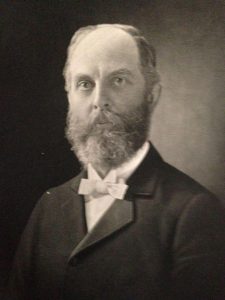
Samuel Mills Ely, Benefactor of Ely Park Golf Course. Photo Credit: Broome County Historical Society
Samuel Mills Ely—For nearly half a century Samuel Mills Ely was a resident of Binghamton, New York, and during that period there were few who contributed more largely to the life of the city than did he. Founder of one of the most important wholesale grocery houses of the city, and identified with various business interests, he demonstrated the often disputed fact that large business success and strict adherence to the principles of the “Golden Rule” are not incompatible. He gave to the community not only the economic advantage accruing from the establishment of a large and important business enterprise, but the inspiring example of a man who, even in his business connections, remains staunchly true to the principles of Christianity.
Samuel Mille (S. Mills) Ely was born in Chester. Connecticut, at the Ely homestead, October 24, 1837, son of Richard and Caroline (Buck) Ely, the former a descendant of the early settlers of Lyme, Connecticut, but born in Essex, Connecticut, August 6, 1798, who was a farmer and prominent in the local public affairs of the town, holding various offices, and the latter born May 5, 1799.
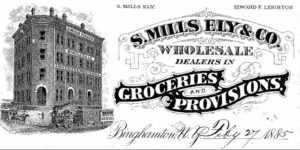
Letterhead of S. Mills Ely & Company. The building is still standing at the corner of Prospect Ave, and N. Depot St. across the railroad tracks from the Kilmer Building in downtown Binghamton. Photo Credit: Broome County Historical Society
Samuel Mills Ely received his education in the public schools of Chester, and later became a student in a grammar school at Deep River, Connecticut. When his school training was completed, he began his active career in the employ of his uncle, Hon. Charles McKinney.
In 1865 he formed a partnership with S. & E. P. McKinney and engaged in the grocery business in Binghamton, which connection he maintained until 1873, when he withdrew and established the wholesale grocery and importing house of S. Mills Ely & Company, of which he was president at the time of his death.
Three years after the founding of the business, in 1876, he formed a partnership with E. F. Leighton, and that connection remained unbroken for a period of thirty-two years, at the end of which time it was terminated by the death of Mr. Leighton, which occurred in 1908.
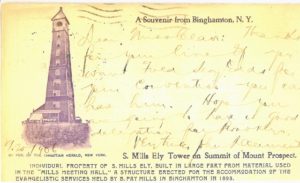
S. Mills Ely Tower on summit of Mount Prospect stood from 1894 to 2007 when a windstorm knocked it down.
The business was a very prosperous one and conducted according to the highest standards of fair dealing, recognizing moral obligations and standards as well as those which are legal. Just one instance serves to illustrate the sincerity with which Mr. Ely made his business adhere to his moral convictions. He did not use tobacco in any form because he believed it to be injurious to health. Therefore, he refused to handle it in his wholesale business even though that article was then one of the large and profitable items of that trade.
Along with the business known as that of S. Mills Ely & Company, Mr. Ely, in association with Roswell J. Bump and Mr. Leighton, organized the Binghamton Chair Company, one of Binghamton’s most successful manufacturing concerns.
Always deeply interested in the highest development of the community in which he lived, Mr. Ely did not hesitate to devote time and energy, as well as financial aid to the furtherance of the public welfare. He rendered valuable service valuable service as a member of the Binghamton Board of Education, and was a member of the Binghamton Club.
His religious affiliation was with the First Presbyterian Church of Binghamton, in which he was an office holder for many years, continuing his service to the time of his death in Binghamton, May 5, 1909. More than fifty of his seventy-two years were spend in “good works” in the truest sense of the word. Consistent in all things, his business affairs, his church life, and his home and social life were lived in accordance with the same principles of uprightness, and he refused to sanction or engage in any business deal not in accordance with his religious convictions.
No greater benevolent and charitable work was ever carried on by a private individual in Binghamton, than was accomplished by Mr. Ely. The Fresh Air Movement and the Humane Society were the recipients of his most generous aid; the Presbyterian Church and the Young Men’s Christian Association found in him a friend that never failed.
In memory of his father and mother he gave a library building to Chester, Connecticut, and his summer home, located on Mount Prospect, Binghamton, he gave to the city as a public park, before his death, hoping that this donation would form the beginning of a complete park system.
In his will Mr. Ely remembered nearly every public charity in his city, and made the Presbyterian Church trustee of a fund for carrying on two benevolent enterprises, the care of the poor in Binghamton, and home missionary work among the foreign-born element of the city. Besides these bequests there were generous legacies to ten other organizations of the city, and perhaps one of the most important parts of his unusual will was the generosity with which he remembered his employees, and his recommendation that they take the value of their bequests in stock of the business which he had developed from a small beginning to a strong enterprise.

Original 1929 plan of the Ely Park 9-hole golf course that opened in 1933. Original routing was today’s Nos. 8, 9, 10, 11, 17, 18, 1, 2, & 7!
Few have lived more worthy and helpful lives than that of Mr. Ely, and both his moral influence and his works are still living and growing in the city to which he gave so generously.
S. Mills Ely married, at Binghamton, New York, October 10, 1867, Mary Hart Hawley, of Binghamton, daughter of Elias and Adaline (Hawley) Hawley, and they were parents of two children: Richard Hawley Ely, who was born July 29, 1868 and died October 8, 1869. 2. Clara May Ely, who was born December 19, 1876, who, with John R. Clements, general manager of the S. Mills Ely Company, was one of the executors of Mr. Ely’s estate. She is a resident of Binghamton.
Gratitude and all credit to William Foote Seward, Editor-in-Chief and Librarian of the Binghamton Public Library for the three-volume series—Binghamton and Broome County, New York, A History—published and copyrighted in 1924 by Lewis Historical Publishing Company, Inc. New York and Chicago. Mr. S. Mills Ely is found in Volume III, Historical and Biographical on Page 30.
Copyright © 2024 | Ely Park Golf Course
Recent Comments